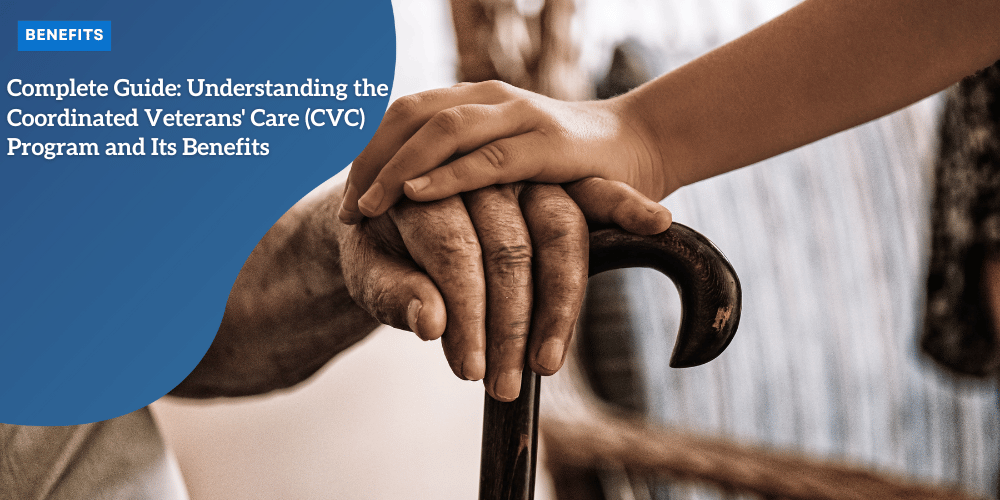Complete Guide: Understanding the Coordinated Veterans’ Care (CVC) Program and Its Benefits

Anúncios
Introduction to the CVC Program
The Coordinated Veterans’ Care (CVC) Program is a proactive initiative aimed at delivering targeted, coordinated care to veterans with chronic conditions.
Predominantly, the program seeks to improve the quality of life for eligible veterans and reduce the frequency of unplanned hospitalizations.
This collaborative effort involves veterans, their General Practitioners (GPs), and designated care coordinators, all working together within a general practice setting.
Primary Objectives
The main objectives of the CVC Program include:
Anúncios
- Enhancing the quality of life for veterans with chronic physical and mental health conditions.
- Reducing the likelihood of unplanned hospital visits by managing ongoing care effectively.
- Promoting health literacy and self-management among veterans.
- Implementing best practice strategies in a person-centered approach to care coordination.
Proactive Care Coordination
Proactive care coordination is a cornerstone of the CVC Program. By fostering a team-based approach, the program ensures that care is not only reactive but anticipatory.
This means that potential issues are identified and managed before they escalate into emergencies.
The collaboration between veterans, their GPs, and care coordinators results in personalized care plans designed to meet each individual’s needs.
Focus on Quality of Life
The CVC Program places a strong emphasis on improving the overall quality of life for participating veterans. This is achieved through:
- Continuous monitoring and adjustment of care plans to address changing health needs.
- Encouraging veterans to actively participate in their healthcare decisions and self-management strategies.
- Leveraging community resources and social assistance programs to enhance social connections and support networks.
By holistically addressing veterans’ health needs, the program not only improves their medical outcomes but also supports their overall well-being, making it a comprehensive approach to veteran care.
Anúncios
Moving forward, the CVC Program’s emphasis on coordinated care, proactive management, and quality of life improvement will be detailed in subsequent sections, ensuring a thorough understanding of its scope and application.
Eligibility Requirements
Who qualifies for the program?
To be eligible for the Coordinated Veterans’ Care (CVC) Program, participants need to hold a valid DVA Health Card – either a Gold Card or a White Card. Gold Card holders qualify if they have chronic health conditions.
On the other hand, White Card holders qualify if they have chronic DVA-accepted mental health conditions, which are conditions recognized by the Department of Veterans’ Affairs as related to a veteran’s military service.
Specific conditions for eligibility
To participate, veterans must meet these specific conditions:
- Chronic Physical Health Conditions: For Gold Card holders, any long-term health condition requiring continuous medical attention.
- Chronic Mental Health Conditions: For White Card holders, the chronic mental health conditions must be DVA-accepted to be eligible.
Exclusions and alternative options
Not everyone is eligible for the CVC Program. The following exclusions apply:
- Non-DVA-accepted Conditions: Veteran White Card holders with mental health conditions that haven’t been DVA-accepted are not eligible.
- Aged Care Facilities: Veterans who are residents of an aged care facility cannot participate in the CVC Program.
However, there are alternative options for those who do not qualify:
- Non-DVA Mental Health Treatment: Non-DVA accepted White Card holders can still access mental health treatment through other programs and support services offered by DVA.
- General Healthcare Services: Veterans can seek general healthcare services available to the public or those specifically catered to veterans outside the CVC Program.
Understanding these requirements clearly ensures that veterans can navigate their eligibility accurately and seek appropriate care support when needed.
This seamless transition helps in laying the groundwork for being well-acquainted with the roles and structure of the involved care team coming next.
The Care Team Structure
Roles and Responsibilities of General Practitioners
General practitioners (GPs) are at the heart of the Coordinated Veterans’ Care (CVC) Program.
They are responsible for assessing the health needs of participating veterans and developing personalized care plans in collaboration with the care team.
GPs provide holistic care, maintaining routine checkups while addressing chronic conditions to ensure the veterans’ health is consistently monitored and managed effectively.
They also play a crucial role in prescribing medications, coordinating with specialists, and adjusting care strategies as needed to align with best practices and the evolving needs of the patients.
Involvement of Care Coordinators and Practice Nurses
Care coordinators and practice nurses are key players in the CVC Program. Their role is to assist GPs by coordinating comprehensive care for veterans.
They ensure that all aspects of a veteran’s care are streamlined and effective, from routine health monitoring to arranging necessary medical appointments.
Care coordinators regularly check in with participants, providing an essential communication link between the patient and healthcare providers.
If GPs do not have access to practice nurses, they may work with community nurses (CNs) approved by the Department of Veterans’ Affairs (DVA) to perform these coordinating roles.
Collaboration Between Team Members
Collaboration is a cornerstone of the CVC Program. This ensures a cohesive approach to care that maximizes the health outcomes for veterans.
The collaborative effort involves regular meetings and communications between the GP, care coordinator, practice nurse, and other relevant specialists.
This teamwork allows for the development and implementation of comprehensive care plans tailored to each veteran’s unique needs, considering their health literacy and self-management abilities.
By working together, the care team enhances the continuity and quality of care, reducing the likelihood of oversight and improving the overall efficiency of the program.
The alignment of roles in the CVC Program ensures veterans receive well-rounded care aimed at improving their quality of life while minimizing the risk of unplanned hospitalizations.
This collaborative, proactive approach to healthcare delivery is vital in achieving the program’s goals and supporting veterans’ health in a holistic manner.
Care Planning and Implementation
Process of Developing Personalized Care Plans
Developing a personalized care plan is a cornerstone of the Coordinated Veterans’ Care (CVC) Program. At the heart of this process is a collaborative effort between the veteran, their general practitioner (GP), and a care coordinator.
The process begins with an initial assessment conducted by the GP to understand the veteran’s health needs and goals.
This assessment forms the foundation of the care plan, which includes prescribed medications, medical treatments, allied health services, and other details aimed at improving the veteran’s quality of life.
The care plan is a living document, regularly reviewed and updated to reflect changes in the veteran’s health status and needs.
Focus on Health Literacy and Self-Management Strategies
Health literacy and self-management are essential elements of the CVC Program. Increasing a veteran’s understanding of their health conditions empowers them to take more control over their care.
This is achieved through tailored educational materials and ongoing communication with the care team. Self-management strategies are integrated into the care plan to encourage veterans to manage their symptoms, adhere to treatment regimens, and make informed decisions about their health.
These strategies include setting realistic health goals, monitoring symptoms, and understanding when to seek medical help.
Integration of Best Practices in Coordinated Care Approaches
The CVC Program emphasizes best practices in coordinated care to ensure high-quality support for veterans. These best practices include:
- Person-Centered Care: Tailoring the care plan to meet the individual needs and preferences of each veteran.
- Proactive Management: Anticipating potential health issues and addressing them before they lead to complications.
- Regular Communication: Ensuring continuous dialogue between the veteran, GP, care coordinator, and any other healthcare providers involved in the veteran’s care.
- Evidence-Based Interventions: Utilizing treatments and interventions that are supported by the latest medical research and guidelines.
By incorporating these best practices, the CVC Program aims to provide comprehensive, proactive, and personalized care to veterans, ultimately improving their health outcomes and quality of life.
 Collaborative effort involves veterans
Collaborative effort involves veterans
As we continue to support veterans through personalized care planning, the next step will delve into the various tools and resources available within the CVC Program to assist both participants and providers.
CVC Program Resources and Tools
Overview of the CVC Toolbox and its Components
The Coordinated Veterans’ Care (CVC) Program offers a vast array of resources designed to streamline patient care and ensure efficient coordination. Central to this is the CVC Toolbox, a comprehensive repository of essential tools and guidelines.
The Toolbox includes:
- An eligibility tool to help determine if veterans qualify for the program.
- Detailed care plan templates for both Gold Card and White Card holders.
- Instructions on when and how to make claims.
- Links to other health services and useful resources.
- An Information Hub with the latest CVC updates and service information.
These components work in tandem to support proactive and individualized healthcare, focusing on improving quality of life and reducing hospital admissions.
Guidance on Accessing and Utilizing Care Plan Templates
Accessing and utilizing care plan templates is a straightforward process that ensures efficient creation and maintenance of personalized care for veterans.
These templates can be found in the CVC Toolbox, providing a structured approach to document and manage patient care.
To use them effectively:
- Access templates: Navigate to the CVC Toolbox and download the relevant care plan template.
- Populate with patient data: Include details such as prescribed medications, scheduled medical treatments, allied health services, and the veteran’s health goals.
- Regular updates: Regularly review and update the care plan to reflect any changes in the patient’s condition or treatment requirements.
These templates are vital for maintaining consistent and high-quality care, ensuring every aspect of a veteran’s health and well-being is methodically managed.
Available Resources for Eligibility Assessment and Claims Processing
Determining eligibility and processing claims are integral parts of the CVC Program. The following resources are available to assist with these processes:
- Eligibility assessment tool: Helps healthcare providers quickly determine a veteran’s eligibility for the program based on card type and chronic health condition.
- Claims processing guides: Step-by-step instructions on how to submit claims, including guidelines on calculating service dates and claim periods.
- Medicare checks: Ensures that claims are validated against eligibility criteria before payment is made.
These resources are designed to make the administrative aspects of the CVC Program as seamless as possible, allowing healthcare providers to focus more on patient care.
The CVC Program is continually evolving, with updates and improvements based on feedback from participants and providers. Keeping abreast of these changes ensures that the program remains responsive and effective for veterans’ needs.
Social Assistance Benefits
The Coordinated Veterans’ Care (CVC) Program doesn’t just offer clinical support—it’s designed to enhance the social wellbeing of its participants too.
A key aspect of this is the 12-week social assistance program, which aims to help veterans reconnect with their community and prevent isolation.
The 12-Week Social Assistance Program
The social assistance provided through the CVC Program is a short-term service available to all participants. This program focuses on helping veterans reengage in meaningful community activities. Over a period of 12 weeks, veterans can receive help in:
- Participating in community activities or courses.
- Making new social contacts and friendships.
- Connecting with community organizations, ex-service groups, or other social activities.
Community Engagement Activities and Support
The types of community engagement activities available are diverse and tailored to fit individual needs and interests. Examples include:
- Educational courses: These might include anything from computer literacy classes to art workshops, allowing veterans to learn new skills while meeting others.
- Social groups: Activities such as book clubs, gardening clubs, or sports teams provide a platform for ongoing social interaction.
- Support services: Veterans can receive help from social workers to create strategies for consistent social involvement and to navigate any barriers to participation.
Referring Clients to Social Assistance Services
Referring a client to social assistance services within the CVC Program is straightforward. General practitioners or care coordinators can initiate a referral by contacting a Veterans’ Home Care (VHC) Assessment Agency.
The agency will assess the veteran’s needs and coordinate appropriate services.
To find the nearest VHC Assessment Agency, healthcare providers or veterans can call 1300 550 450. This ensures that the transition to social assistance is smooth and that veterans can begin participating in these activities as soon as possible.
This robust social component of the CVC Program ensures veterans have comprehensive support, helping them stay connected and engaged within their communities.
Program Updates and Support
Recent Changes and Improvements to the Program
The Coordinated Veterans’ Care (CVC) Program continues to receive updates and improvements to better serve its participants.
Recent changes include minor but essential corrections in the CVC Program information brochure and the CVC Program Guide for General Practice.
These changes were necessary to correct wording errors, ensuring that all provided information aligns accurately with participants’ entitlements.
Updated versions of these guides are now available on the Department of Veterans’ Affairs website, and correction stickers can be obtained by sending an email to [email protected].
It is important to note that enrollment in the CVC Program does not grant access to any type of medication, including medicinal cannabis. Veterans should discuss their medication needs directly with their General Practitioner (GP).
Additional information on medicinal cannabis and the Repatriation Pharmaceutical Benefits Scheme (RPBS) can be found on the DVA website, and inquiries can be directed to the Veterans’ Affairs Pharmaceutical Advisory Centre at [email protected] or by calling 1800 552 580.
Available Support Channels and Contact Information
Support for participants and healthcare providers within the CVC Program is readily available through multiple channels.
You can contact the CVC Program team directly at 1800 550 457 for assistance related to the program. For general information and updates, participants are encouraged to check the Department of Veterans’ Affairs website regularly.
For issues related to the social assistance component of the program, veterans can engage with community services, educational courses, and support groups by contacting the Veterans’ Home Care (VHC) Assessment Agency at 1300 550 450.
This agency will help refer clients to appropriate community engagement activities designed to enhance social connections and overall well-being.
Continuous Feedback and Improvement Mechanisms
Continuous feedback is vital for the ongoing improvement of the CVC Program. Participants and providers are encouraged to share their experiences and suggestions.
Regular surveys are posted on the DVA website to gather input from users, ensuring that the program stays responsive to the evolving needs of veterans.
In addition to feedback forms, providers must adhere to the legal requirements set out in the “Notes for CVC Program Providers.”
These notes detail the responsibilities of healthcare professionals involved in the program, including GPs, Practice Nurses, and Aboriginal and Torres Strait Islander Primary Health Workers.
By incorporating regular updates and actively seeking feedback from participants, the CVC Program aims to maintain its effectiveness and responsiveness to the needs of veterans.
This continuous cycle of assessment, improvement, and communication is essential for delivering comprehensive and coordinated care.






